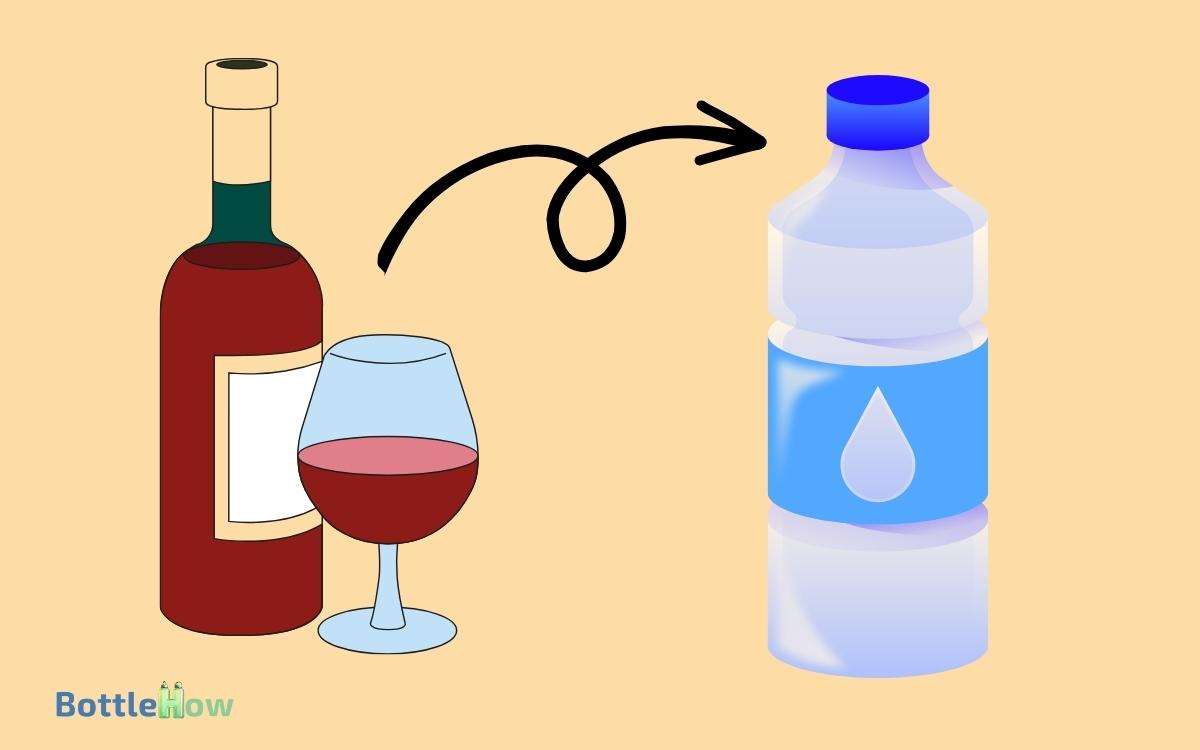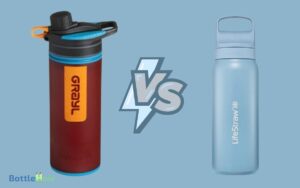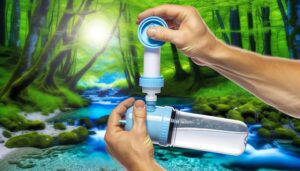Can You Put Wine in a Plastic Water Bottle? Explained!
Putting wine in a plastic water bottle is ill-advised. Plastic, particularly polyethylene terephthalate (PET), permits oxygen transmission, hastening oxidation and deteriorating wine quality.
Wine’s acidity can trigger harmful chemical leaching from the plastic, compromising both safety and flavor. Such materials also allow UV light penetration, further affecting the wine’s integrity.
Glass bottles remain superior as they maintain the wine’s delicate flavors and aromas. If you explore further, you’ll discover more nuanced reasons why dedicated wine containers are indispensable for preserving your wine’s exquisite nuances.

Key Takeaways
Understanding Wine Storage
Proper wine storage is essential for preserving its flavor, aroma, and overall quality. You need to take into account temperature, humidity, light exposure, and bottle orientation.
Ideal storage temperature is between 45-65°F, with 55°F being best. Fluctuations can ruin your wine’s integrity. Maintain humidity around 60-70% to keep corks from drying out, preventing oxidation.
Light, particularly UV rays, can degrade wine, so always store bottles in a dark place. Horizontal storage ensures corks remain moist, sealing the bottle properly.
Avoid vibrations, as they disturb the wine’s maturation process. Each of these factors plays an important role in safeguarding your wine’s character and longevity.
By adhering to these guidelines, you’ll guarantee your wine remains at its peak for years to come.
Plastic Bottle Composition
When considering the storage of wine, it’s important to understand the composition of plastic bottles and how they can affect the wine’s quality.
Most plastic bottles are made from polyethylene terephthalate (PET). While PET is lightweight and shatter-resistant, it isn’t impervious to oxygen transmission.
Over time, even minimal oxygen ingress can alter the wine’s flavor profile and accelerate its aging process.
Additionally, plastic bottles may contain additives like plasticizers, which can leach into the wine and impart undesirable tastes.
Furthermore, PET is less effective at blocking UV light compared to glass, which can lead to the degradation of sensitive compounds in wine.
Understanding these factors helps you make an informed decision when choosing storage options for your wine.
Chemical Reactions
Exposure to plastic can induce a variety of chemical reactions in wine, potentially compromising its integrity and flavor. The wine’s ethanol and acids can interact with the plastic’s compounds, leading to leaching.
This process may introduce harmful chemicals like BPA or phthalates into the wine. Additionally, oxidation can occur more rapidly in plastic, altering the wine’s composition.
| Chemical Reaction | Cause | Effect on Wine |
|---|---|---|
| Leaching | Interaction with plastic | Introduction of harmful chemicals |
| Oxidation | Permeability of plastic | Accelerated degradation |
| Polymerization | Reaction with ethanol | Altered molecular structure and taste |
Understanding these reactions is essential. You wouldn’t want to compromise your wine’s quality, especially if it’s a prized vintage.
Taste Alteration
When considering taste alteration, you must account for the chemical interactions between wine and plastic, which can compromise flavor integrity.
Plastic containers often contain compounds like phthalates that leach into the wine, altering its taste profile.
Ensuring flavor preservation is essential, as even minimal contamination can greatly degrade the wine’s nuanced aromas and palate.
Chemical Interaction Effects
The interaction between wine and the chemicals in plastic can greatly alter the wine’s taste, often introducing undesirable flavors.
Plastic bottles, especially those made from polyethylene terephthalate (PET), may leach compounds like acetaldehyde and antimony into the wine.
These chemicals can impart off-flavors, ranging from a plastic-like taste to a chemical bitterness, compromising the wine’s integrity.
Additionally, plastic’s permeability to oxygen can accelerate oxidation, further degrading the wine’s nuanced flavors.
This degradation is particularly detrimental to more delicate wines, where subtle notes are essential. For wine preservation and taste fidelity, glass remains the superior choice.
Flavor Preservation Concerns
Pouring wine into a plastic water bottle can compromise its flavor profile, leading to noticeable taste alterations that detract from the wine’s intended character.
The interaction between the plastic and the wine can introduce undesirable elements that mar the subtle nuances originally crafted by the winemaker.
Here are five key concerns to take into account:
- Chemical leaching: Plastic components can seep into the wine, altering its taste.
- Oxygen permeability: Plastic bottles aren’t as airtight as glass, causing oxidation.
- Temperature sensitivity: Plastic is more prone to temperature fluctuations, affecting the wine’s stability.
- Residual odors: Plastic can retain odors from previous uses, contaminating the wine.
- Aesthetic experience: Drinking wine from plastic diminishes the overall sensory enjoyment.
Understanding these factors ensures you appreciate wine as intended.
Safety Concerns
Considering the chemical interactions between wine and plastic, you should be aware of potential health risks.
Wine’s acidic nature can cause plastic to leach harmful chemicals like bisphenol A (BPA) and phthalates. These compounds can disrupt endocrine function and pose long-term health hazards.
Additionally, plastic water bottles mightn’t be designed to withstand alcohol content, leading to structural degradation and contamination.
Choosing the wrong type of plastic can also introduce off-flavors and odors, further affecting your wine’s safety and enjoyment. Always opt for food-grade, BPA-free plastics if you must use plastic containers.
However, the safest option remains glass or stainless steel, which don’t interact chemically with wine and provide a purer, safer drinking experience.
Longevity of Wine
Securing the longevity of wine requires understanding how storage conditions and container materials influence its aging process. When you store wine, the choice of container plays a pivotal role.
Traditional glass bottles with corks play a crucial role in allowing minimal oxygen ingress, essential for aging.
Conversely, plastic water bottles, though convenient, are permeable to oxygen and can accelerate spoilage.
Consider these factors:
- Oxygen Permeability: Plastic allows more oxygen, hastening oxidation.
- Chemical Interaction: Plastic can leach chemicals into the wine, altering taste.
- Light Exposure: Plastic offers less UV protection, causing premature aging.
- Temperature Stability: Plastic is less effective in maintaining stable temperatures.
- Aesthetic and Prestige: Glass bottles enhance the wine’s perceived value and experience.
Understanding these nuances secures your wine retains its intended character and quality.
Temperature Sensitivity
When contemplating wine storage, temperature sensitivity is crucial. Exposure to heat can expedite the degradation of flavor compounds, while inadequate cold storage may cause condensation, leading to potential spoilage.
You must guarantee consistent, ideal temperatures to preserve the wine’s integrity and nuanced profile.
Heat Impact on Flavor
Storing wine in a plastic water bottle can greatly alter its flavor profile due to the material’s poor insulation properties and susceptibility to temperature fluctuations. When exposed to heat, plastic can leach chemicals into the wine, affecting its taste and aroma.
Additionally, higher temperatures accelerate the oxidation process, leading to a loss of freshness and complexity.
- Chemical leaching: Heat can cause plastic compounds to seep into the wine, altering its flavor.
- Oxidation: Elevated temperatures speed up oxidation, diminishing the wine’s quality.
- Volatile aromas: Essential aromatic compounds can dissipate more rapidly.
- Flavor degradation: Heat can lead to a flat, unbalanced taste profile.
- Microbial growth: Warmer conditions can promote unwanted microbial activity, further spoiling the wine.
Understanding these risks can help you maintain your wine’s integrity.
Cold Storage Concerns
Placing wine in a plastic water bottle and then in cold storage can cause the wine to contract and expand, stressing the bottle and potentially compromising the seal.
Temperature fluctuations in cold storage exacerbate this issue, as the plastic bottle lacks the rigidity of glass.
You promote micro-oxygenation, where tiny amounts of air seep in, affecting the wine’s flavor profile and aging process.
Additionally, plastic is more permeable than glass, which might result in unwanted chemical interactions between the wine and the bottle.
For maintaining the integrity and quality of your wine, it’s best to use containers specifically designed for wine storage, such as glass bottles with proper corks or screw caps. They guarantee excellent preservation even under fluctuating temperatures.
Alternatives to Plastic
Instead of using plastic, consider glass or stainless steel containers for storing wine, as they preserve the wine’s quality and prevent chemical leaching.
These materials offer superior protection against oxidation and UV light, ensuring that your wine remains pristine. They also don’t interact chemically with the wine, safeguarding its flavor profile.
- Glass Bottles: Ideal for long-term storage and aging, maintaining the wine’s integrity.
- Stainless Steel Flasks: Perfect for short-term use, providing an inert environment.
- Ceramic Vessels: Aesthetic and functional, offering a non-reactive storage option.
- Crystal Decanters: Enhance the presentation while preserving taste.
- Wine Bags with Foil Lining: Portable and designed to minimize air exposure.
Practical Scenarios
When you’re in a pinch and need a convenient way to transport wine, it’s important to understand the potential consequences of using a plastic water bottle.
Plastic bottles, typically composed of PET (polyethylene terephthalate), aren’t designed to preserve wine’s complex flavors and aromas.
Over time, the plastic can impart undesirable tastes and odors, compromising the wine’s quality. Additionally, plastic is permeable to oxygen, which can accelerate oxidation and spoil the wine.
In practical scenarios like picnics or impromptu gatherings, consider the duration your wine will be in the plastic bottle. If it’s just for a short period, the impact might be minimal.
However, for longer storage, opt for appropriate alternatives like wine totes or reusable glass flasks to maintain integrity.
Expert Opinions
You’ll find that experts consistently warn against putting wine in plastic water bottles due to chemical interaction concerns. They highlight that plastic can leach substances affecting both taste and quality. Additionally, certain plastics may not provide an adequate barrier against oxygen, potentially causing the wine to spoil more quickly. This is why glass or specially designed wine containers are recommended for maintaining flavor and integrity. While discussing plastic, a common question arises: can water bottle stickers go in the dishwasher? The answer depends on the material of the sticker, as some may peel or fade when exposed to heat and moisture.
Additionally, they emphasize that proper wine storage duration is greatly reduced when using plastic containers.
Chemical Interaction Concerns
Many experts caution that storing wine in a plastic water bottle can lead to chemical leaching, potentially compromising both the taste and safety of the wine.
Plastic bottles often contain compounds like BPA and phthalates, which can seep into the wine under certain conditions.
You should be aware of the following risks:
- Chemical Leaching: Plastics can release harmful substances into the wine.
- Acidity Reactivity: Wine’s acidic nature can accelerate the leaching process.
- Temperature Sensitivity: Heat can exacerbate the interaction between wine and plastic.
- Health Risks: Consuming leached chemicals can pose health hazards.
- Regulatory Standards: Wine storage containers are subject to stricter regulations than standard plastic bottles.
Ensuring the integrity of your wine involves understanding these complexities.
Taste and Quality Impact
Understanding the chemical interaction concerns is fundamental, but equally significant is how plastic storage can degrade the wine’s flavor profile and overall quality.
Renowned sommeliers and enologists often highlight that plastic can impart undesirable flavors, mask subtle notes, and accelerate oxidation.
Let’s break down the impact:
| Aspect | Impact on Wine |
|---|---|
| Flavor | Plastic can introduce off-flavors and diminish complexity. |
| Aroma | Plastic may absorb and alter the wine’s bouquet. |
| Acidity | Increased interaction can lead to harsh, unbalanced acidity. |
| Oxidation | Plastic is more permeable, hastening oxidation and aging. |
In essence, storing wine in plastic compromises the nuanced characteristics and integrity that aficionados cherish. For ultimate enjoyment, glass remains the gold standard.
Storage Duration Limits
Given the inherent risks associated with plastic, experts advise that wine stored in such containers should be consumed within a very short timeframe to minimize quality degradation.
The chemical interactions between the wine and plastic can lead to rapid flavor deterioration and potential health risks.
- Oxidation: Plastic containers are more permeable to oxygen, accelerating wine spoilage.
- Chemical Leaching: Certain plastics can leach harmful substances into the wine.
- Temperature Sensitivity: Plastic is less effective at insulating, making wine more prone to temperature fluctuations.
- UV Exposure: Plastic offers limited protection against UV light, which can alter wine’s chemical composition.
- Microbial Growth: Plastic can harbor bacteria more easily than glass, potentially contaminating the wine.
To maintain the wine’s integrity, it’s essential to follow these guidelines.
Final Thoughts
In conclusion, placing wine in a plastic water bottle compromises its quality due to chemical interactions and inadequate preservation capabilities.
Plastics can leach harmful substances like phthalates and BPA, which alter the wine’s aroma and flavor profile.
Additionally, plastic bottles don’t offer the same oxygen barrier as glass, leading to premature oxidation and degradation of the wine.
For best enjoyment, store your wine in glass bottles designed specifically for this purpose.
If portability is necessary, consider using a wine-preservation system or a vacuum-sealed stainless steel container. These options maintain the wine’s integrity and ensure you experience it as intended.
Understanding these factors allows you to make informed decisions and savor your wine in its most favorable condition.
Conclusion
To sum up, you shouldn’t store wine in a plastic water bottle. The risk of chemical leaching and taste alteration far outweighs any convenience.
Opt for glass or specialized wine containers to preserve the integrity and flavor of your wine. Remember, wine is a delicate symphony of flavors—don’t let a plastic bottle hit the wrong note.
Trust expert advice, and treat your wine with the respect it deserves. Cheers to making informed choices!






